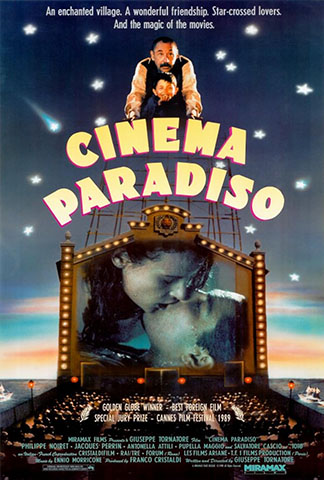Cinema Paradiso: A Deep Dive into a Beloved Film
“Cinema Paradiso” (Italian: Nuovo Cinema Paradiso) is a 1988 Italian comedy-drama film directed by Giuseppe Tornatore. It’s a deeply nostalgic and emotionally resonant story about the power of cinema, friendship, and the bittersweet passage of time. Here’s a comprehensive look at the film, covering its plot, themes, impact, and more:
Plot Summary (with some spoilers, but trying to be mindful)
The film is framed as a story within a story. Salvatore “Toto” Di Vita, a successful film director, returns to his small Sicilian hometown of Giancaldo after learning of the death of Alfredo, the projectionist at the local cinema, Cinema Paradiso.
The bulk of the film unfolds as a flashback, detailing Toto’s childhood and adolescence. As a mischievous boy, Toto is captivated by the cinema and develops a close relationship with Alfredo. Alfredo becomes a father figure, teaching Toto about film, life, and love.
The Cinema Paradiso isn’t just a place to watch movies; it’s the heart of the community. It’s a gathering place, a source of escape, and a window to the world. However, the cinema faces challenges – censorship by the local priest, a devastating fire, and ultimately, the changing times with the rise of television.
Toto grows up, falls in love with Elena, and dreams of becoming a filmmaker. Alfredo encourages him to pursue his passion, even if it means leaving Giancaldo. He makes a difficult sacrifice to ensure Toto’s success. The film culminates with Toto returning to his hometown and receiving a final, poignant gift from Alfredo.
Key Themes
- The Power of Cinema: The film is a love letter to cinema itself. It explores how movies can transport us, shape our imaginations, and connect us to universal emotions. It shows how cinema can be a source of joy, escape, and even spiritual experience.
- Nostalgia and Memory: The film is steeped in nostalgia, evoking a longing for a simpler time and a lost way of life. The flashbacks are filtered through Toto’s memories, creating a warm, melancholic tone.
- Father-Son Relationship (or Mentor-Mentee): The relationship between Toto and Alfredo is the emotional core of the film. Alfredo provides guidance, support, and tough love, shaping Toto into the man he becomes. It’s a beautiful portrayal of a non-traditional father figure.
- The Passage of Time and Change: The film depicts the decline of a small-town cinema and the impact of modernization on traditional communities. It reflects on the inevitability of change and the bittersweet feeling of leaving the past behind.
- First Love: Toto’s youthful romance with Elena is a significant part of his coming-of-age story, representing innocence, passion, and the pain of lost opportunities.
- Sacrifice: Alfredo makes a profound sacrifice for Toto’s future, demonstrating the depth of his love and belief in the young boy’s potential.
Why is it so beloved?
- Emotional Resonance: The film taps into universal emotions of nostalgia, loss, and the importance of human connection. It’s a deeply moving experience that resonates with audiences of all ages and backgrounds.
- Beautiful Cinematography: The film is visually stunning, capturing the beauty of the Sicilian countryside and the atmosphere of the Cinema Paradiso.
- Ennio Morricone’s Score: The film’s score, composed by the legendary Ennio Morricone, is iconic and deeply affecting. It perfectly complements the film’s emotional tone and enhances its impact. The main theme is instantly recognizable and evokes a powerful sense of nostalgia.
- Authentic Portrayal of Italian Life: The film offers a glimpse into the culture and traditions of a small Sicilian town, creating a sense of authenticity and immersion.
- Universal Story: While rooted in a specific time and place, the film’s themes are universal, making it relatable to audiences worldwide.
Versions of the Film
There are actually two main versions of “Cinema Paradiso”:
- Theatrical Version (155 minutes): This is the version most widely available and the one most people are familiar with.
- Director’s Cut (174 minutes): This longer version includes more scenes and provides a more complete and nuanced portrayal of Toto’s life and relationships. Many consider the Director’s Cut to be the definitive version. It includes more scenes with Elena and expands on the complexities of their relationship.
Awards and Recognition
- Academy Award for Best Foreign Language Film (1990)
- Golden Globe Award for Best Foreign Language Film (1990)
- BAFTA Award for Best Foreign Language Film (1990)
- Numerous other awards and nominations
Impact and Legacy
“Cinema Paradiso” is considered a masterpiece of Italian cinema and one of the greatest films ever made. It has influenced countless filmmakers and continues to be celebrated for its emotional power, beautiful storytelling, and enduring themes. It helped to revitalize interest in Italian cinema internationally and remains a beloved classic for generations of film lovers.
Where to Watch
Availability varies by region, but you can often find it streaming on platforms like:
- Criterion Channel (often has the Director’s Cut)
- Amazon Prime Video (for rent or purchase)
- Apple TV (for rent or purchase)
- YouTube (for rent or purchase)
If you haven’t seen “Cinema Paradiso,” it’s a film that deserves to be experienced. Be prepared to be moved, to laugh, and to reflect on the power of cinema and the beauty of life.
Do you have any specific aspects of the film you’d like to discuss further? Perhaps you’re interested in the symbolism, the characters, or the historical context? I’m happy to delve deeper into any area you’d like.
